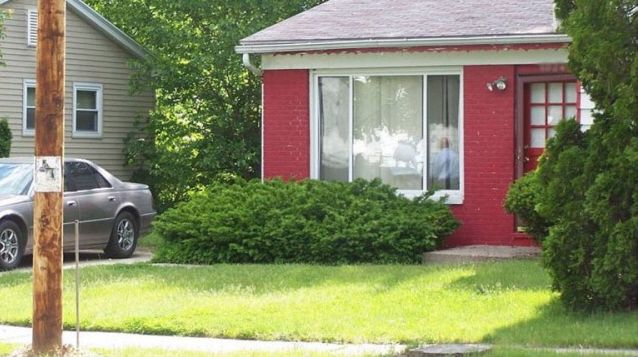
The ņŌįń√ŇŅ™ĹĪĹŠĻŻ of Michigan recently put out an interesting . Like other ņŌįń√ŇŅ™ĹĪĹŠĻŻ reports on cameras (such as those by our affiliates in and , and the on our national site) it summarizes the policy arguments against cameras. But it also focuses on a uniquely disturbing application of surveillance cameras: their deployment in residential neighborhoods.
In the picture-worth-a-thousand-words department, take a close look at this photograph that is included in the report:

Would you want to live there? And be subject to police monitoring 24 hours a day, seven days a week? I suspect most people would not like it if a live police officer were stationed on the sidewalk in front of their house, photographing their comings and goings at all hours. This is little different. As the report notes,
Today’s surveillance units in residential Lansing not only provide a 360-degree view of the area up to 500 feet, but also have zoom capabilities. Each day, the cameras engage in 24-hour viewing and imaging of the surrounding area utilizing high-definition color, night vision, and focus features that resolve minute detail in even the most severe environmental conditions. This means that the Lansing cameras give police the ability to read words on a piece of paper in someone’s hand within 50 feet, clearly discern a license plate that is 300 feet away, or recognize a face at 400 feet. Although the cameras are not monitored 24 hours a day, everything viewed by the cameras is digitally recorded and stored on hard drives for two weeks or more
There are limits placed on surveillance of private areas, but they are not adequate:
‚ÄúPrivacy zones‚ÄĚ‚ÄĒdefined by the LPD as windows of homes and other ‚Äúnon-public areas‚ÄĚ‚ÄĒare not recorded. Still, while most private windows have been blocked from viewing, many front stoops and fenced backyards were only blocked after the ņŌįń√ŇŅ™ĹĪĹŠĻŻ‚Äôs recommendation to do so.
I spoke with Rena Elmir of the ņŌįń√ŇŅ™ĹĪĹŠĻŻ of Michigan and she told me,
The police feel that they‚Äôve included sufficient safeguards by including that feature. Still, if you have a mailbox that‚Äôs at the end of your property line, the idea that a police officer could see whom you‚Äôre getting mail from using the zoom ability of the camera is worrisome. And just as easily as you can blur those areas, such as windows, you can disable that feature. The idea that this could be misused by police‚ÄĒeven if it‚Äôs just one person, one bad apple‚ÄĒis pretty scary.
The ņŌįń√ŇŅ™ĹĪĹŠĻŻ of Michigan also had an independent researcher look at the impact of the cameras on the minority population. Comparing the representation of black residents to white residents, the study concluded that African Americans were twice as likely to be under camera surveillance as white residents. Concludes the report:
The disproportionate monitoring of people of color actually exacerbates the conditions that facilitate anger and resentment of law enforcement. In a society where many African Americans already feel profiled, installing surveillance cameras in their communities to constantly monitor their behavior only serves to heighten their sense of powerlessness and to foster mistrust of government officials‚Ķ. One resident in an affected neighborhood expressed fear that when his grandson practices basketball on his driveway, the stranger on the other side of the camera would be silently judging him according to his own prejudices and stereotypes‚Ķ. The installation of cameras has elicited negative responses from some African American residents, many of whom feel they are being viewed with suspicion as potential criminals. Their sentiments have been reflected in studies verifying that racial minorities are frequently targeted by camera operators in other communities ‚Äúwith a relish that impl[ies] a deep prejudice.‚ÄĚ

